May 19, 2025 | 15:41 GMT +7
May 19, 2025 | 15:41 GMT +7
Hotline: 0913.378.918
May 19, 2025 | 15:41 GMT +7
Hotline: 0913.378.918
Mr. Nguyen Bao Tri, Production Director of Luong Quoi Coconut Processing Co., Ltd. (based in Giong Trom district, Ben Tre province), explained that since September 2024, under new EU regulations, trading companies are no longer allowed to independently certify organic coconut material areas. Instead, legally recognized organizations representing farmers, such as cooperatives, will now take on this responsibility.
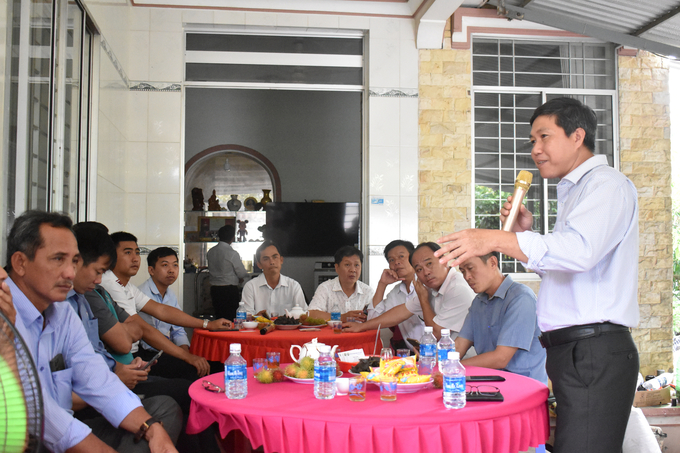
Mr. Nguyen Bao Tri shared with cooperatives about the organic coconut purchasing collaboration at a meeting to exchange organic coconut production experiences at Thoi Thanh Agricultural Cooperative, Thanh Phú district. Photo: Minh Dam.
In the past, Luong Quoi Coconut Company and other trade entities worked directly with households, shouldering the responsibility for documentation and certification of organic coconut production. However, buyers raised concerns over traceability, believing this practice might lead to fraud.
"From September onwards, only cooperatives will handle certification, with the cooperative named as the owner, not the company. The cooperative must sign agreements with farmers in its coconut value chain, while companies can only sign purchase contracts with cooperatives holding certified organic coconut material areas," Mr. Tri clarified.
However, independent certification costs are high, reaching hundreds of millions of dong, which many cooperatives struggle to afford.
Luong Quoi Coconut Company is an enterprise that links up to purchase a very large quantity of organic coconuts in Ben Tre province, with 3 to 5 million coconuts per month. To address this issue, Luong Quoi Coconut Company invited 17 cooperatives, which act as local representatives for the company’s procurement, to discuss and agree on two approaches.
Firstly, cooperatives with sufficient resources can fund their own certification. Secondly, cooperatives without the necessary capacity will receive financial support from Luong Quoi Coconut Company to conduct assessments.
“The cooperatives in Thanh Phu and Binh Dai districts agreed that they lack the capacity and funds to conduct self-assessments and have asked the company for financial support, to which the company has agreed. Under this arrangement, the company will sign a purchase agreement with these cooperatives. On the other hand, cooperatives capable of self-certification are free to trade with any enterprise and are not bound to any single entity,” said Mr. Tri.
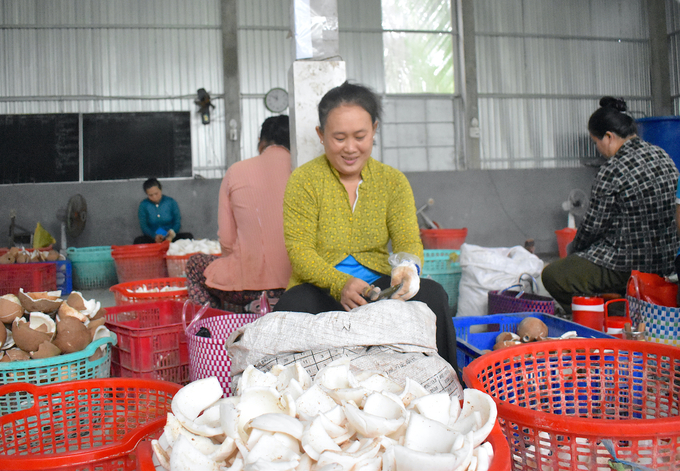
Processing coconut meat at Thoi Thanh Agricultural Cooperative has created jobs for dozens of local workers. Photo: Minh Dam.
In fact, Luong Quoi Coconut Company’s plan has received strong support from the cooperatives. In Thanh Phu District, a cooperative alliance for organic coconuts has been established with seven members. The alliance will work directly with member cooperatives to assess the organic coconut supply areas. Consequently, the Thanh Phu Organic Coconut Alliance will represent organic coconut growers in member cooperatives for product traceability and contract negotiations with enterprises.
Mr. Tran Van Ung, Director of the Thanh Phu Organic Coconut Alliance, stated, “The alliance will serve as the coordinator for evaluations to reduce costs and represent the owners of the Thanh Phu organic coconut supply areas. The purchase prices offered by enterprises to farmers will remain the same as last year, with an additional 20% if below 50,000 VND per dozen, and 15% if between 50,000 and 100,000 VND per dozen. Overall, thanks to the support from enterprises, we have managed to overcome challenges and stabilize production.”
Regarding the new EU regulations on ownership of organic coconut supply areas, Mr. Nguyen Thanh Phuong, Chairman of the Ben Tre Cooperative Alliance, emphasized that cooperatives must ensure productivity and capacity to meet the requirements for organic coconut certification according to EU standards.
For localities, implementing the organic coconut value chain and establishing concentrated supply areas must closely link with enterprises to support cooperatives in developing and completing the value chain. Cooperatives need to enhance their capabilities to meet business requirements and attract investments from enterprises to process and preserve coconuts, thereby creating jobs for rural labor.
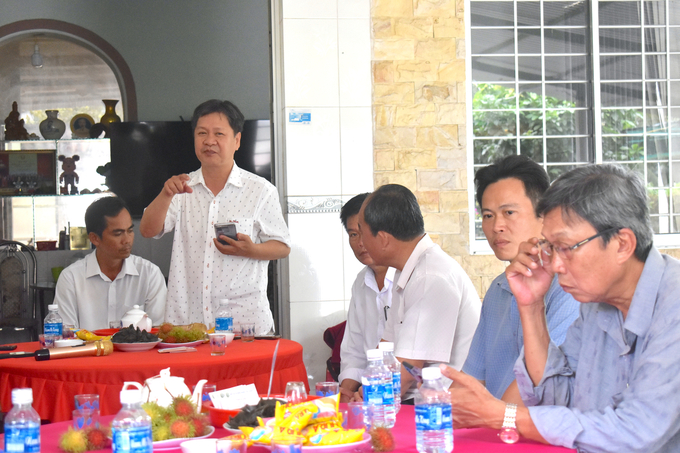
Mr. Nguyen Thanh Phuong, Chairman of the Ben Tre Provincial Cooperative Alliance, shared with cooperatives the development orientation for the collective economy, especially for cooperatives operating in the coconut industry in the coming period. Photo: Minh Dam.
According to Mr. Nguyen Thanh Phuong, in the development of cooperatives, especially in the coconut industry, active participation and experience-sharing by members are crucial factors for sustainable growth. A strong commitment to organizing production and services, particularly through forming teams within cooperatives, is essential to enhance operational efficiency.
Additionally, he suggested leveraging favorable provisions for cooperatives under the 2024 Land Law, which took effect on August 1, 2024. Notably, Article 124, Clause 1 of the 2024 Land Law stipulates cases of land allocation and lease without auctioning land-use rights or bidding to select investors for land-use projects, and Article 157, Clause 1 provides for land-use and lease fee exemptions and reductions.
"In the coming time, localities must incorporate suitable land-use plans and allocate appropriate land funds, creating conditions for cooperatives to undertake land lease procedures as regulated. This will allow for the establishment of premises, construction of headquarters, drying yards, warehouses, production facilities, and service centers, directly serving agricultural production, including the coconut industry," emphasized Mr. Nguyen Thanh Phuong, Chairman of the Ben Tre Cooperative Alliance.
Mr. Nguyen Chanh Binh, Deputy Director of the Ben Tre Provincial Agricultural Extension Center, shared that currently, the province has over 20,000 hectares of coconut production that meets organic standards, about 13,000 hectares certified. The coconut value chain includes 34 cooperatives, 32 cooperative groups with 7,000 members producing on an area of over 10,000 hectares, and 14 accompanying enterprises. He requested that the Cooperative Alliance and MARD support the unit’s management of the value chain.
Translated by Kieu Chi

(VAN) The German Agricultural Society (DLG) explores the possibility of establishing a mechanization service center in Vietnam’s Mekong Delta to support farmers in accessing and utilizing advanced machinery.

(VAN) On May 16, the Department of Water Resources Management, in collaboration with the Food and Agriculture Organization of the United Nations (FAO), held a signing ceremony for the GEF-8 project document.

(VAN) Food safety, mechanization, vocational training, and market opening are key areas of cooperation expected between the Vietnamese Government and the Federal Republic of Germany.

(VAN) Deputy Minister Nguyen Quoc Tri also expressed his hope that Cuba will soon overcome its current challenges, attain food security, and further expand cooperation with Vietnam.

(VAN) The project contributes to enhancing the resilience of communities vulnerable to the impacts of climate change, with a primary focus on local women.
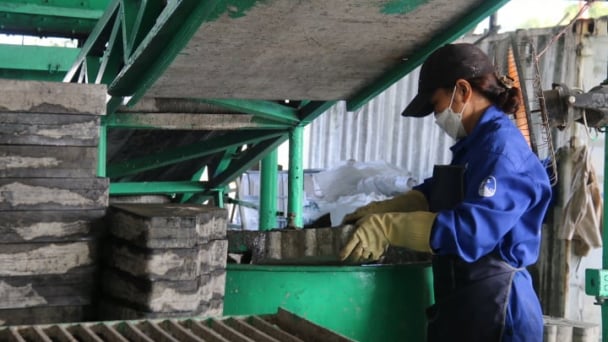
(VAN) Green materials help save energy and resources. However, after more than 10 years, Vietnam has only developed over 200 green buildings with more than 6 million square meters of floor space.
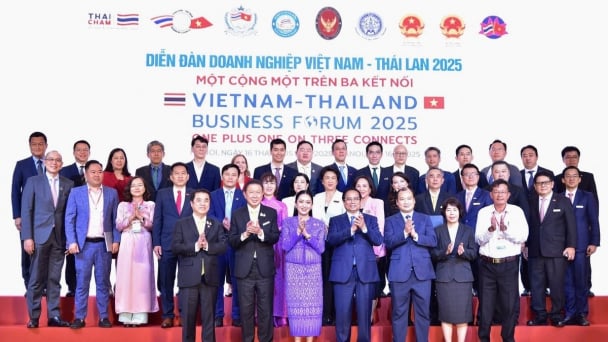
(VAN) Vietnam - Thailand Business Forum 2025: One plus one on three connects, marking a milestone in the comprehensive strategic partnership between the two nations.